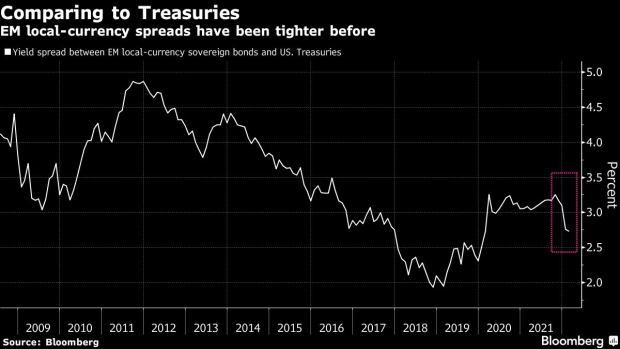Feb 6, 2022
Asian Bonds Lose Appeal as Region Seen Last to Boost Rates
, Bloomberg News

(Bloomberg) -- Bond managers are turning lukewarm on Asian debt on speculation the region will be the last in emerging markets to start raising rates.
Fidelity International Ltd. and abrdn Plc are among the firms avoiding Asian local debt and favoring bonds elsewhere in the developing world on the view that the region will take longer to start tightening monetary policy. Meantime, central banks in several countries in Latin America are ahead of the curve, creating scope for a rally in the region’s debt.
“We expect EMEA and Latin American central banks to finish their monetary policy tightening cycles before Asia,” said Paul Greer, a London-based money manager at Fidelity. “So, we are generally avoiding Asian local bonds and see more value in other regions.”
Most Asian local bonds have fallen so far this year, while South Africa, Brazil, Chile and Turkey recorded the biggest gains among developing nations, even as the Federal Reserve prepares to raise rates. While policy makers in Latin America and Europe spearheaded the tightening cycle in emerging markets, rates have been kept on hold in most of Asia -- with China even easing its policy in January.
“The juice is to be had in LatAm and EMEA,” said Edwin Gutierrez, the head of emerging-market sovereign debt at abrdn in London, who likes debt from Chile, South Africa and Brazil. “Asia is just starting to experience a pickup in inflation, as countries move away from zero-Covid policies.”
Of course, there’s risk of downside pressure across emerging local bonds from hawkish policy makers in major economies. The European Central Bank is no longer ruling out an interest-rate hike this year, while the Fed is broadly expected to embark on a tightening cycle in March.
Still, “effective yields should maintain their premium over U.S. Treasuries in most developing economies,” said Damian Sassower, chief emerging-market credit strategist at Bloomberg Intelligence, in a Jan. 27 report.
While most central banks in Asia are expected to hike only in the third quarter, Brazil, which raised interest rates 8.75 percentage points since last year, will probably cut its key rates by the first quarter of 2023, according to a Bloomberg survey. Russia may start easing as early as the third quarter, though the outlook is clouded by rising geopolitical risks.
“In countries like Russia, Czech Republic, Brazil and Chile, the tightening will be over in the first half of this year,” said Julio Callegari, lead portfolio manager at JPMorgan Asset Management in Hong Kong.
So far this year, Indonesia and Malaysia have kept rates on hold, in contrast to peers including Hungary and Chile, which surprised with a whopping 150 basis point rate increase. Brazil signaled the world’s most aggressive monetary tightening cycle is closer to an end last week after taking borrowing costs past 10% for the first time in nearly five years. In Asia, South Korea, Pakistan and Sri Lanka have raised rates.
The prospect of rate cuts coming earlier in Brazil and Russia is helping lure funds like Fidelity, which said it sees attractive value in the nations’ bonds. The fund also prefers debt in Mexico and South Africa, Greer said.
Here are some of the major events and data to watch in emerging markets this week:
- Slovenia and El Salvador are both set to post consumer price data for January on Monday.
- Russia is expected to release a reading of January inflation on Wednesday. The Bank of Russia looks set on Friday to tighten monetary policy further to contain a sustained spike in inflation, according to Bloomberg Economics.
- Chile will release its trade balance and copper export figures on Monday
- Brazil will publish inflation and retail sales data on Tuesday and an economic activity index, a proxy for GDP growth, on Friday.
- Mexico is expected to raise interest rates by half-point on Thursday.
- The Czech Republic will publish retail sales data for December on Tuesday.
©2022 Bloomberg L.P.


